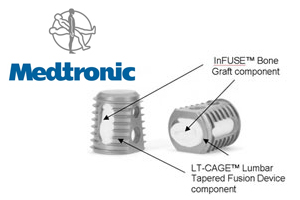
UPDATED June 2, 2014, with comment from Medtronic.
Health insurer Humana (NYSE:HUM) leveled a racketeering lawsuit against Medtronic (NYSE:MDT) last week, accusing the medical device company of rigging the presentation of data on its controversial Infuse bone graft product and of pushing its use in off-label procedures.
The lawsuit, citing the Racketeer Influenced & Corrupt Organizations statute known as RICO, alleges that Medtronic ran a deliberate campaign to fudge the data on Infuse to conceal adverse events and induce insurers such as Humana to cover Infuse procedures.
"Defendants paid for and sponsored publication of academic and peer-reviewed literature that falsely represented Infuse and [recombinant bone morphogenetic protein-2] as safe and effective for uses not approved by the Food & Drug Administration. Defendants knew or should have known that Humana would rely on the fraudulent literature to pay for Infuse and/or BMP," according to the lawsuit. "Defendants also aided and facilitated hospitals and physicians in obtaining payments from Humana through false statements and fraudulent omissions and concealment to obtain insurance payouts where Infuse and/or BMP was used. Humana would not have paid for such claims had it known the true facts regarding the uses of Infuse and/or BMP or the risks and efficacy of such uses."
In a statement emailed to MassDevice.com today, a Medtronic spokeswoman said the company "vigorously disagrees" with the accusations that it sought to influence the publication of data on Infuse and called the lawsuit’s claims "baseless."
"Medtronic strongly believes that the safety profile reported to the FDA and detailed in product labeling support the continued safe use of Infuse bone graft for approved indications. The company has reported potential adverse events to the FDA, and those risks have been reflected on the product’s label from the time of the FDA’s approval," the spokeswoman wrote. "Medtronic vigorously disagrees with any suggestion that the company improperly influenced peer-reviewed published manuscripts. Medtronic does not compensate physicians for the use or endorsement of our products, and disagrees with any suggestion to the contrary. Physicians are compensated for their intellectual property rights and contributions through royalty payments, and for legitimate and documented consulting services provided to the company. Royalty and consulting agreements help medical device companies develop life-saving technologies and are a commonplace and appropriate practice in the medical device industry.
"The claims in this case are baseless. The potential risks and benefits of Infuse bone graft have been described in the product labeling since 2002, and all payers had access to that information. Medtronic stands behind Infuse bone graft and will continue to vigorously defend the product and our actions in court," she wrote.
The controversy over the Infuse product, a bone morphogenetic protein that stimulates bone growth, erupted during the summer of 2011 when the Spine Journal dedicated its entire June issue (PDF) to problems with the product.
A shareholder lawsuit accused Medtronic and its leadership of misleading investors about its prospects for Infuse, and the ensuing clamor spurred federal investigations into allegations that Medtronic’s paid consultants may have concealed Infuse’s risks. In the fall of 2012 a U.S. Senate report blasted Medtronic over its handling of the Infuse product, saying the company deliberately obscured evidence of adverse events and promoted off-label use of the product and paid out millions to the doctors who co-wrote positive studies, charges that the company "vigorously" denied.
And last year, a Medtronic-funded Yale University project examining patient-level data on Infuse found that, although Infuse is equivalent iliac crest bone grafts, company-sponsored studies under-reported adverse events associated with Infuse.
Last month Medtronic agreed to pay $22 million to settle an estimated 950 lawsuits filed over Infuse, admitting to no wrongdoing in what it termed a "compromise" of disputed claims.

